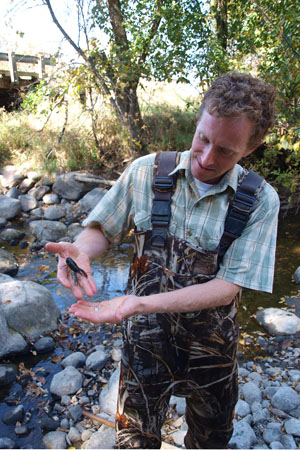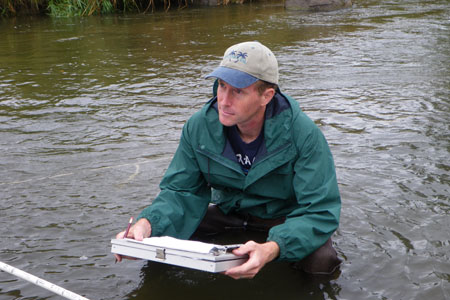Paul Wymar
Watershed Scientist, Chippewa River Watershed Project
Living on Seven Mile Creek and working on the Chippewa River in western Minnesota, Paul Wymar has found a home and community. Paul is the watershed scientist for the Chippewa River Watershed Project (CRWP) and finds his job very fascinating. The type of work he does brings in all different sciences from biology to forestry to hydrology to geology to help him figure out what is going on with water quality. “I didn’t end up going into my career thinking I was going to do water quality,” said Wymar “but this is where I ended up. I am very happy I did.”
Paul started with the CRWP in 2000 joining one of the longest tenure and dedicated watershed projects in the Minnesota River Basin. The main focus of his job is to coordinate the water quality monitoring for the Chippewa River Project. According to Paul, “the simple way to describe my job is to learn about the river. I am tasked at figuring out what is going on in the river,” he explains. “Whether it is to find out why it is polluted or why is it clean or what is causing the different things we are seeing in the river.” To accomplish this he oversees standard monitoring sites, low flow transparency sites, citizen monitoring sites, geomorphology tracking sites and benthic macroinvertebrate survey sites.
In college as Wymar worked towards a master’s degree in forestry he planned to go into international development work but that all changed because of his advisor, a forest hydrologist. Paul ended up taking a lot of hydrology classes and discovered he had an interest in water, water quality and water work. The rest they say is history. Today, Paul lives on a farm along the natural channel of Seven Mile Creek with his family raising hogs for the organic market and has dived hard into the organic apple business raising a wide selection of varieties to sell locally. Each day Paul continues to discover and learn more about the rivers by conducting research, paddling them and just wading into the water.
“The thing that I appreciate most about these rivers is that they are here and just how incredible they are to be down in them,” relates Wymar. “By having this job I have really gained a new perspective because I have to stop at these bridges and get down to the river. It is quiet and I can hear the water flowing by and I see the bugs or I can see the birds or feel the wind. You really end up getting a real sense of the river. I feel like I am taking a pulse of the river. You get down by the bridge and that’s where all the life is. You see all the birds, the bugs are just flying all over the place and the fish in the river.”
MEET THE EXPERTS VIDEO
Paul Wymar



